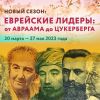Last week, Booknik read books by Stieg Larsson and Tony Barlam, a study by Yoav Regev, talked to Matisyahu, watched some Israeli movies, attended the Eshkol picnic, and Eshkolot lectures, walked around Tel Aviv at night, learned something new about chicken, listened to Israeli unemployed, talked about himself, voted for the best hokkus, lived with sense and pleasure, listened to Frank London, learned some K-words, strolled through Madrid with the kids, and cooked a spicy soup. In the meantime, Booknik Jr. learned the story of Berek, read some Alfred Szklarski, cooked some gazpacho, met a cricket, and asked his readers a lot of questions.
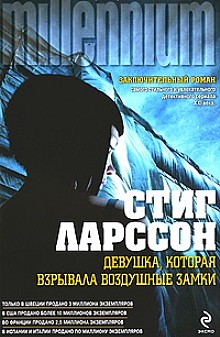
Luftslottet som sprangdes, by Stieg Larsson
Stieg Larsson is the Swedish author who wrote three novels published posthumously that became the last year’s absolute bestsellers, and a publishing sensation. The scandalous story of their publication, the author’s ambiguous biography, and, chiefly, the issue of his authorship are studied by Booknik reporter Lesya Bobrova with partiality as she tries to decipher the Larsson’s Trilogy success. What happened there? Was his publisher a marketing genius, did the author’s biography help, or are there any other, hidden, forces at play?
A Golden Key, or The Adventures of Golem
A Wooden Key, by Tony Barlam
The direct descendant of the toy's creator told the real story to Alexey Tolstoy, not the one reworked by Carlo Collodi. The man was not the carpenter Geppetto, and not the organ-grinder Carlo but the preacher Yeshua, who seemed to have been crucified in Jerusalem in the beginning of the new era. Why “seemed”? Because it was not he who was crucified but a “nozar” created by him, a wooden creature that had the incredible gift of persuasion yet absolutely devoid of willpower. Booknik reviewer Yevgenia Ritz reads A Wooden Key, and muses on golems.
From Astrakhan to the Galilee
Sabotnikim be Galil, by Yoav Regev
In September 1997, as Israeli marines were conducting their operation in Lebanon, the commandos found themselves in a minefield. Twelve soldiers died in the explosions and shoot-outs, including their commander colonel Yosi Kurakin. His unusual last name drew attention, for the man was a veritable hero in his last battle. It turned out, Kurakin belonged to a family of Russian subbotniks, the Russian proselytes who joined the Jewish people by their conviction, and resettled to Erez Israel over one hundred years ago. Booknik reviewer Ariel Bulstein reads the book about the Kurakins, and other Judaisers.
…and many other zany stories in the Books & Reviews section.
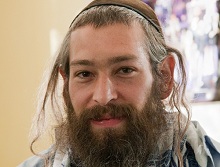
The American Matthew Paul Miller better known by his Hebrew name Matisyahu gave his concert in the Moscow’s Green Theater. The event was much anticipated, and Matisyahu was cheered. The public sang along to his most memorable melodies, as well as some lesser known songs. Booknik reporter Grigory Durnovo spoke with Matisyahu about his music, the past and the future, and asked him the questions our readers had submitted.
Into the Left Muscle. Bullets over Broadway: The Festival of Israeli Cinema in Moscow
A Matter of Size, directed by Sharon Maymon and Erez Tadmor
Lost Islands, directed by Reshef Levy
At the Israeli film festival in Moscow, on July 2 through 7, the best Israeli movies of the last three years were screened, about war, love, tolerance, and some irreconcilable controversies. Booknik supported the festival information-wise, and the Eshkol Project discussed the films with moviegoers, and cinematographers. Booknik now tells about two such screenings: Dina Suvorova watched A Matter of Size, and Irina Zeltsman, Lost Islands.
…and many other watchable performances in the Articles & Interviews section.
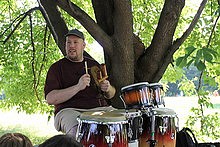
On the hot day on June 27, in Moscow Kolomenskoye Park there appeared a not very large but noisy and lively band of picnickers. Those lucky were the ones who subscribed to participate in the closing events for the Eshkol and Eshkolot seasons, including the picnic, a culinary workshop, with the journalist Nellie Shulman telling about preparation and consumption of lemonades, and Israeli fast food, and a music workshop, with the drummer and percussionist Vladimir “Big” Glushko telling about playing a middle-eastern goblet drum. The eyewitness’ account by our reporter Maxim Eidis follows.
Judentum: Jewish Intellectuals of the Weimar Republic
Both Eshkolot seminars under the title Judentum gathered many listeners who were quite prepared to sacrifice their spare time, and warm summer evenings for serious lectures about the Weimar Republic intellectuals, and Martin Heidegger’s students. The lectures covered Ernst Bloch, Walter Benjamin, Hannah Arendt, and Paul Celan. Maxim Eidis clearly preferred it, too.
The White Nights of Tel Aviv as More a Passionary Phenomenon Than a Natural One
The White Night is now a traditional annual celebration of the Tel Aviv White City’s declaration as a part of the world’s cultural heritage. This year, starting on a warm night of July 1, Tel Aviv celebrated the whole night long, and the Booknik’s ubiquitous Israeli reporter Ariel Bulstein walked around the city in the night, trying his best to be everywhere at once.
…and many other marvelous walks in the Events & Reports section.
Not a Bird? 15 Facts about Chicken
As a rule, from 17 Tammuz through 9 Av, many Jewish communities go into mourning in connection with the siege of Jerusalem by the Romans, the destruction of the Temple, and many other calamities brought upon the Jews in summer months throughout the history. These three weeks, they don’t eat meat in particular. For a lot of religious Jews the principal meat is chicken, and this is why our columnists Marina Karpova and Yevgeny Levin come up with 15 facts about it.
…and many other interesting factoids in the Columns & Columns section.
The Daily Yarn: Hindi-Rusi Bhai-Bhai, and a Kindhearted Computer
Keren Pevzner continues with her stories about her wonderful unemployed students who do not necessarily wish to seek any employment. Now we have a kindhearted computer, some internationalism, the amazing land of Ethiopia, the terrible land of Sudan, and the vital issue if the Ethiopians are Jewish or not.
…and many other striking yarns in the Stories & Essays section.
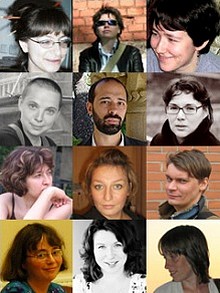
Booknik is soon turning four. A quite venerable age, especially if you’re a spirit. On July 18, Booknik is celebrating his birthday in the Moscow club Squat. Come along, you’ll see the congratulations from the Goodnight Band, Psoy Korolenko, Sergey Osokin, and Olga Chikina. As soon as he, being the cause of this celebration, deserves it, Booknik feels he has the right to talk about himself. This quiz is about him.
Hokku Schmokku Contest
Hokku is going to rule the world soon, judging from your submissions to out wonderful contest. The voting on your hokkus remains open until July 14. Vote for the ones you like best, for the winners of the users’ voting, and the Booknik editors’ choices will be awarded with nice prizes, including wonderful books (their wonderfulness guaranteed), and T-shirts with winning hokkus. The best oeuvres will also be read aloud at the **Booknik Birthday Party in the Moscow Squat Club on July 18.
…и многое другое in the Contests & Quizzes section.
The History of Israel in Hebrew 18: It’s Good to Die for Your Motherland
It turns out, you can die not just like that but with some sense to your dying. You could die for your Motherland, for an idea, a party, for your grandchildren, and for their bright future. However, those grandchildren of yours might start laughing at their ancestors’ heroism, and their selflessness. Isn’t it truly horrible? Ahem. Maybe those grandchildren just don’t want to die? Maybe they’d better live with some sense and pleasure? Booknik’s proud talking head Arkan Kariv goes on with his historical anecdotes.
The Yiddish Fest 2010: Three-Handed Playing
With one hand, Frank London conducted the Yiddish Fest’s Consolidated Capella, with his other hand, he played his trumpet, and his third hand assisted him in cheerfully whistling to the audience. The citizens of Jericho would have been stunned by the sound of his trumpet, and they would have surrendered immediately, and happily. Without laying their city to ruin.
Hebrarium, the Lexicon of Jewish Whatnots: K1
Is it allowed to eat a lion? Why mixtures are banned? What is blood? Watch our K-Hebrarium, and our video wiz Kirill Chichayev will explain it to you about kashrus, kil'ayim, and the blood.
Don’t Grudge the Brew 50: Red Cold Summer Peppers
This is the 50th anniversary of our program Don’t Grudge the Brew. It all started over a year ago, with the Monte Carlo eggplant salad. Today, our inimitable chef Roman Gershuni struggles with the summer heat, and cooks a spiced cold vegetable soup.
…and many other edible delights in the Video Blog section.
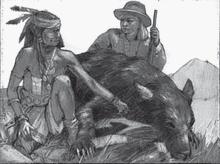
Tomek na wojennej ścieżce, by Alfred Szklarski
Go ask your dad if he read about Tomek when he was a kid. He’ll definitely say yes he did. The books about that courageous Polish boy were very popular in the Soviet Union. Although they were written about a very distant past, the first half of the 19th century, and that world was very different from ours, the present-day readers still like the main character’s bravery, humor, and resourcefulness. Booknik Jr. is now publishing an excerpt.
Like Berek at Kock
In Poland, they have this saying, “Jak Berek pod Kockiem.” Where is that Kock? And who is this Berek? The Polish people know. Berek Joselewicz is their national hero, and they even named a street in Warsaw after him. Katya Novikova tells the story of the Polish-Jewish hero.
What Grandmother Rachel’s Meat-Grinder Can Do
When you say “gazpacho,” you hear something Italian in the word, although the Italians would have said it differently. Because “gazpacho” is a Spanish cold tomato soup. Varvara Haitina shows you how to cook this Spanish dish with the help of her Jewish grandmother’s meat-grinder.
Booknik Radio: Why Does a Cricket Creak?
Why does a cricket creak? He must be lonely like a peak. Is it know what he eats? Does anyone know where he sleeps? The Yiddish Poet Kadya Molodovsky knows the answers.
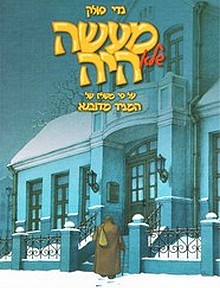
Fishel is the main character in the four graphic books by the well-known Israeli author and artist Gadi Pollack. His stories told in pictures are based on the Jewish sages and present-day rabbis’ tales, and parables. Yelizaveta Guller reads these books, and tells you what a schlimazel is.
Fruits, and Veggies, and Some Herbs
Booknik Jr. writes a lot about food. Why? To cook, and eat what you have cooked is just as interesting as to read or write books. We have already conducted a culinary quiz, but ever since that time, a lot of water boiled over on the stove. Now it is high time to know if you’re ready to carry a title of the master chef or still remain an underling.
To Madrid
When coming to Spain, a general tourist traditionally go to Barcelona. Serious travelers prefer the scorching sun “from Seville to Grenada.” However, if you travel with kids, and do not want to fly any charters with their mind-boggling unexpected surprises, sooner or later you’ll find yourselves in Madrid. Anna Poznanskaya will now tell you what to do there.
…and many other family delights at Booknik Jr., also known as Family Booknik, our own web site for kids and their parents.
Let me bring you up to speed. Booknik and Family Booknik are supported by the AVI CHAI Foundation.









